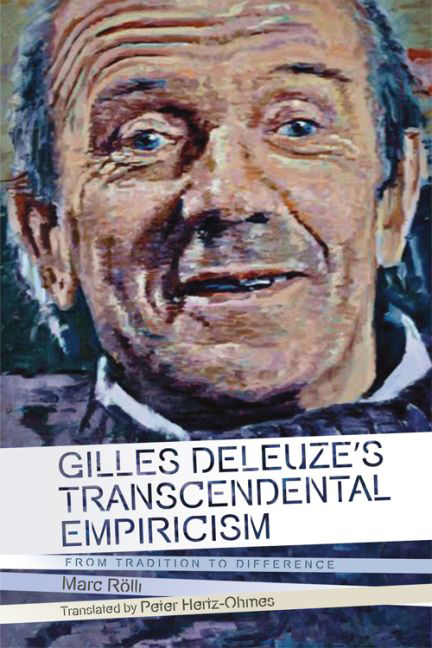Book contents
- Frontmatter
- Contents
- Translator's Note
- Author's Foreword
- Introduction: Can Empiricism Have a Transcendental Aspect?
- PART I EMPIRICISM/TRANSCENDENTALISM
- PART II FROM PHENOMENON TO EVENT
- 4 Husserl's Concept of Passive Synthesis
- 5 Heidegger's Metaphysics of Finitude
- PART III DELEUZE'S TRANSCENDENTAL EMPIRICISM
- Conclusion: Where Do We Go from Here? Lines of Flight
- Bibliography
- Index
4 - Husserl's Concept of Passive Synthesis
from PART II - FROM PHENOMENON TO EVENT
Published online by Cambridge University Press: 27 April 2017
- Frontmatter
- Contents
- Translator's Note
- Author's Foreword
- Introduction: Can Empiricism Have a Transcendental Aspect?
- PART I EMPIRICISM/TRANSCENDENTALISM
- PART II FROM PHENOMENON TO EVENT
- 4 Husserl's Concept of Passive Synthesis
- 5 Heidegger's Metaphysics of Finitude
- PART III DELEUZE'S TRANSCENDENTAL EMPIRICISM
- Conclusion: Where Do We Go from Here? Lines of Flight
- Bibliography
- Index
Summary
A passive synthesis is a contradiction in terms if the synthesis is a process of composition, and if the passivity consists in being the recipient of multiplicity […] What we meant by passive synthesis was that we make our way into multiplicity, but that we do not synthesise it. Now temporalisation satisfies by its very nature these two conditions.
(Merleau-Ponty 1962: 496)The fact that none of Gilles Deleuze's many books promises in its title a study of phenomenology should not lead to over-hasty conclusions. Clearly Deleuze had strong opinions about Heidegger. There are plenty of connections to Husserl as well that are just as adequately documented. We could start by distinguishing two groups of texts that refer directly to Husserl. First, at the end of the 1960s, Deleuze presents his position regarding Husserl's philosophy above all in Logic of Sense (see for example Series 14 and 16), but also in Difference and Repetition. Then, in the mid-1980s, he undertakes an examination of Foucault's critical relation to phenomenology (Deleuze 1988b: 110ff.), which leads, finally (together with Guattari), to a ‘prospective’ conceptual analysis of phenomenological thought in What Is Philosophy?
At first glance Deleuze's connection to Husserl's phenomenology seems to lean in the direction of disapproval, for Deleuze sympathises fundamentally with Heidegger's critical considerations regarding representative thought, considerations that can also be directed at phenomenology itself. Foucault demonstrates this in exemplary fashion for Deleuze when, following Heidegger, he finds the mark of logical reflection of representative thought in the ‘empirico-transcendental doublet’. The prima facie rejection of phenomenology, especially evident in Deleuze's later texts, will have to be relativised. Often it is the implicit affinities that provoke critical distance. Deleuze stresses his negative judgement of phenomenology because, in spite of all points in common, he wants to stress where he differs. Therefore it is not surprising that Deleuze, in his book on Foucault, is rather more interested in how phenomenology self-critically radicalises itself – and thus bumps into its own difference philosophical boundaries. The origin of a structuralist philosophy of difference is, to be precise, essentially related to (post‑)phenomenological reflection.
- Type
- Chapter
- Information
- Gilles Deleuze's Transcendental EmpiricismFrom Tradition to Difference, pp. 95 - 127Publisher: Edinburgh University PressPrint publication year: 2016



